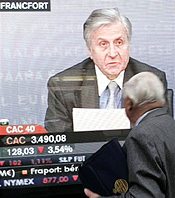voa标准英语2008年-Europe Slashes Interest Rates(在线收听)
 |
| A man in Paris watches Jean-Claude Trichet, President of the European Central Bank, 06 Nov 2008 |
The Bank of England slashed its key interest rate by an unusually large amount - 1.5 percent - to three percent, a level not seen since Winston Churchill was prime minister more than 50 years ago.
The European Central Bank followed suit, but cut interest rates by a more modest half of a percent. It was the second time that European central banks cut interest rates in less than a month amid increasing signs that an economic slowdown has become a full-blown recession.
"The cut is extremely welcome and probably overdue," said Michael Fallon, who heads Britain's Commons Treasury sub-committee. "They have cut massively. Only a month after the last cut, before that could even take effect, they have cut again. So clearly, the bank now knows just how bad things are, and we are, in fact, entering a deep recession."
The Bank of England described what it sees as "a very marked deterioration in the outlook for economic activity at home and abroad" and said the threat of inflation has subsided.
Across the Atlantic, experts say economic signals appear equally grim. The U.S. Labor Department reported continued high numbers of workers filing for unemployment benefits, while American retailers are reporting steep declines in sales.
U.S. retail sales analyst Ken Perkins says the trends point to a disappointing holiday shopping season as American consumers grapple with tight budgets and heavy debt burdens.
"A lot of consumers are carrying relatively high debt levels at this stage," he said. "The discretionary dollars available to them right now are much less than they have been in the past, especially heading into this holiday season."
Interest rate cuts in Europe did little to boost investors' moods. Major European stock markets plunged between five and seven percent, matching similar losses in Asia. In New York, Wall Street's Dow Jones Industrial Average recorded triple-digit loses in afternoon trading.